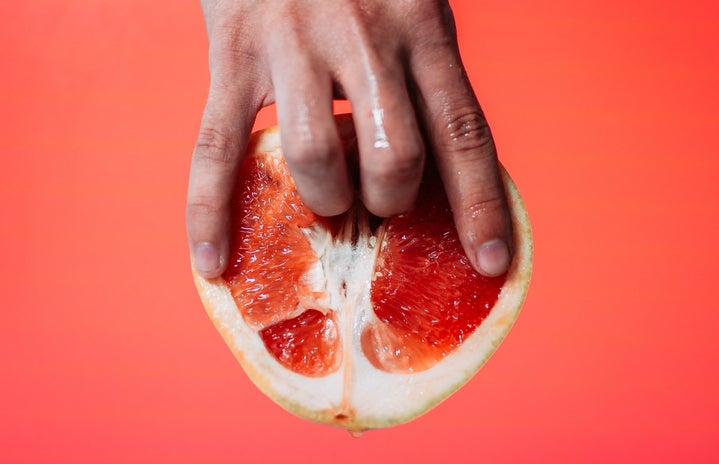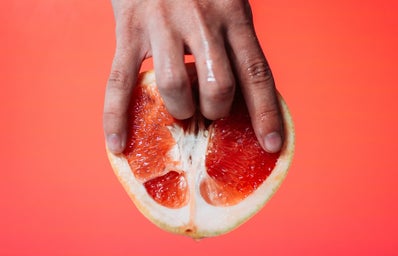A couple days ago, I started watching a new TV show called Dare Me, about a high school cheerleading squad. Is it your typical high school show? Well, yes, but it has a dark twist. Just from the first episode alone, I could tell I was going to like the series. Surprisingly, it wasn’t the mysterious aura or awe-inducing gymnastics that hooked me. No, what really got me into the binge-watch was the short, yet significant, hookup scene towards the end of the pilot. In the scene, two characters, Addy and Jordy, are making out in the woods, and something unexpected happens.
Jordy tries the “head push” on Addy, insinuating he expects oral sex from her, to which she responds, “Seriously? You’re pulling that shit on me?”
He then replies, stuttering, “I don’t know what you want.”
Addy laughs and says, “Just make me feel good.”
I’ll admit, when I first sat down to watch this show, I thought it would simply be a mediocre, uncomplicated form of entertainment — the kind of show I could mindlessly watch while eating or scrolling through social media. But this scene piqued my interest. I thought, maybe the showrunners actually (for once) are going to place the female, rather than the male, protagonists at the center of storylines surrounding sexual pleasure.
Though I haven’t finished the series yet, I do think that the writers made a great effort to showcase female pleasure in most, if not all, of the sex scenes. The writers took it a step forward and included scenes of women orgasming during sexual encounters. They also showed women being enthusiastic and knowledgeable about sex and pleasure. Even more, the show presents us with women like Addy who aren’t afraid to vocalize their desires to their male partners. In other words, the show imbued its characters with a sex-positive attitude, thus attempting to represent and normalize female sexual desire – something that we don’t often see in media.
How proper representation can help normalize female sexuality
You might be asking yourself: why does this representation matter so much though? While there are many academic studies that point to the positive effects of media representation, I’d also like to add a more intuitive explanation to the mix.
To put it simply, it matters because without it, many people are led to believe the dominant narrative around sex — that it’s an act meant to serve and pleasure the man. Too often, female pleasure is viewed as a “chore,” or as an optional add-on to a sexual interaction, or, worse, as something that’s shameful and wrong. That’s probably why I found it so refreshing to watch a scene that didn’t cast female sexuality in this harmful light.
This disregard for female pleasure is shockingly common. According to a study by Indiana University, Chapman University and Claremont Graduate University, only 65% of heterosexual women orgasm frequently, compared to a whopping 95% of heterosexual men. The study also found that lesbian women are more likely to be sexually satisifed than straight women – 86% of lesbian women usually orgasm during sex.
Of course, merely representing female pleasure on TV isn’t the sole solution to closing what is known as the “orgasm gap.” Nonetheless, I, for one, can only imagine how my perception of female pleasure would be drastically different if I had grown up watching sex scenes that were both realistic and equitable. For example, I used to believe the commonly held misconception that women only orgasm from penetration, which is obviously far from the truth. Had I seen this misconception dispelled on television shows, I think I would’ve had a much better understanding of my own sexuality.
After speaking with my friend Amelia*, a student at NYU, I found that I wasn’t alone in this sentiment. She spoke to me about the show She’s Gotta Have It, which follows the main character Nola Darling and her relationships with various men. Amelia liked the show not only because Nola is a “free” character who is not “tied down by” her romantic commitments, but also because it portrays female sexuality in a realistic and healthy light. “I feel like it’s important because as much as we’re taught about the dangers of sexuality, women should also be taught about the pleasures,” she says, “and it should be something that we can have the right to have control over.”
Where to find the representation we need
Seeing as many schools lack adequate sex education, media often becomes our teacher when it comes to topics such as female pleasure. And the media can often lead us astray with their portrayals of women having sex. That’s why we need more sex-positive media representation of female pleasure – it can help us supplement our knowledge of sex and pleasure, especially when our school systems fail to provide us with adequeate information.
It makes me hopeful that, recently, shows like Dare Me have begun to recognize why this type of representation is so important for young women and men who are becoming sexually active.
Another great show that is showcasing female pleasure in a lighthearted yet informative way is Sex Education. There’s one scene in particular that comes to mind when I think about that show. In the scene, Aimee, one of the main characters, discovers the joys of self-pleasure (after some urging from her friend Otis), and realizes that she doesn’t need a man to satisfy her desires.
I found the scene so relatable and funny, but I also felt excited by the possibility of normalizing discussions about female masturbation. Male masturbization is usually not stigmatized in the same way that female masturbation is, and I feel that it’s important to finally do away with this double standard.
I hope that, going forward, more shows can include representations of women enjoying and being excited about sex, whether they’re doing it with a partner, or flying solo. And, ultimately, I hope that television can start preaching a message that all of us need to hear: sex isn’t just for the man.
*Name has been changed.


